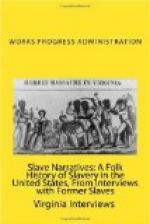“I tell you, dem Yankees took us by starvation. Twant a fair fight. Dey called it a vict’ry an’ bragged ‘bout Vicksburg a-fallin’, but hongry folks aint got no fight lef’ in ’em. Us folks was starved into surrenderin’.
“De slaves spected a heap from freedon dey didn’ git. Dey was led to b’lieve dey would have a easy time—go places widout passes—an have plenty o’ spendin’ money. But dey sho’ got fooled. Mos’ of ’em didn’ fin’ deyse’ves no better off. Pussonally, I had a harder time after de war dan I did endurin’ slav’ry.
“De Yankees passed as us frien’s. Dey made big promises, but dey was poor reliance. Some of’ em meant well towards us, but dey was mistol’ ‘bout a heap o’ things. Dey promised us a mule an’ forty acres o’ lan’. Us aint seen no mule yet. Us got de lan’ all right, but twant no service. Fac’ is, ‘twas way over in a territory where nothin’ ’ud grow. I didn’ know nothin’ ‘bout farmin’, nowhow, I’d always been a coachman an’ play companion to de white chillun.
“De war was over in May 1865, but I was captured at Vicksburg an’ hel’ in jail ’til I ’greed to take up arms wid de Nawth. I figgered dat was ’bout all I could do, ‘cause dey warnt but one war at Vicksburg an’ dat was over. I was all de time hopin’ I could slip off an’ work my way back home, but de Yankees didn’ turn me loose ’til 1866.
“Den I worked in a saloon in St. Louis. Dat was ’bout all I knowed to do. All de time I was a-cravin’ to come back to Mississippi. It sho’ suits my tas’ better’n anywhere I’se ever been.
“When I landed back home my white folks welcome me. After awhile I married a gal what was real smart ‘bout farmin’ an’ chicken raisin’. So us share-cropped an’ raised a fam’ly. Somehow us always scrapped along. Sometimes it was by de hardes’, but us always had plenty t’eat.
“All de cullud folks what lived to git back home took to de lan’ ag’in. If dey marster was dead dey went to his frien’s an’ offered to share-crop. Dey was all plumb sick o’ war. Is sho’ is ongodly business. I never will forgit de fearsome sight o’ seein’ men die ’fore dey time. War sho’ is de debbil’s own work.
“De Klu Klux Klan didn’ bother me none. Course, I was feared of’ em at firs’, but I soon learnt dat long as I b’haved myse’f an’ tended my business dey warnt after me. Dey sho’ disastered dem what meddled wid de white folks. Nobody but a smart Alec would a-done dat. Only Niggers huntin’ trouble mixed into white folks bus’ness. Onct or twict I seen Klu Klux’s ridin’ by, but dey always traveled fas’ an’ I kep’ my mouf[FN: mouth] shut.
“After de war my marster come back home. De fences was gone, de cattle was gone, de money an’ de Niggers was gone, too. On top o’ all dat de whole country was over-run an’ plumb took over by white trash. It was cautious times.
“After awhile, robbers an’ low down trash got to wearin’ robes an’ pretendin’ dey was Klu Klux’s. Folks called dem de ‘white caps.’ Dey was vicious, an’ us was more scared of ’em dan us’d ever been o’ de Klan. When dey got likkered up de debbil sho’ was turnt loose.




